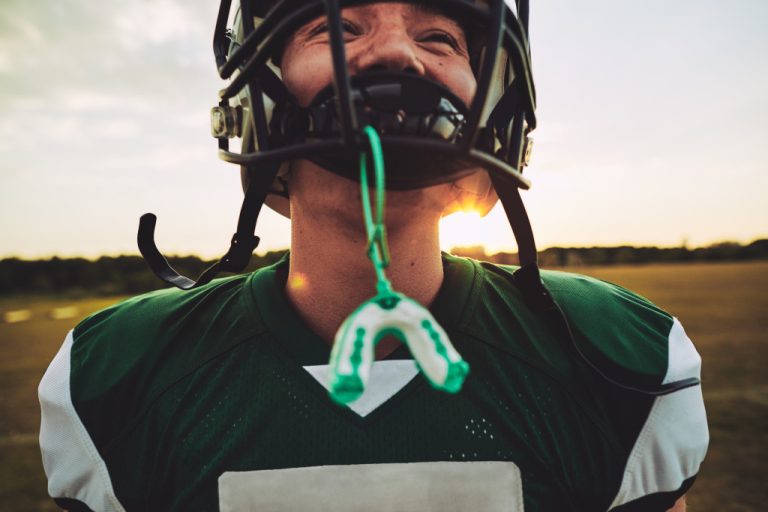• Wear a properly fitted mouthguard made of medical-grade materials when playing contact sports to prevent dental injuries.
• Practice good oral hygiene habits, such as brushing twice daily and flossing, to maintain overall dental health.
• Avoid sugary sports drinks, which can lead to tooth decay and weaken teeth making them more susceptible to injury.
• Stay hydrated to keep your saliva production up and wash away bacteria.
• Seek professional treatment immediately if you experience dental injuries while playing contact sports.
Participating in contact sports such as football, rugby, or hockey can be a great way to stay fit and active. It gives you great accomplishment and can provide many health benefits, such as improved strength and coordination. However, knowing the risks of participating in these sports is important. If you’re not careful, you could risk your teeth!
The Risks of Not Protecting Your Teeth
The primary danger to your oral health while playing contact sports is the risk of having a blow to the mouth, causing painful or even serious injury. This could include anything from broken teeth to chipped tooth enamel and, in some cases, jaw damage. In addition, there is also a risk of gum inflammation or bleeding due to the force of impact or a flying object.
Preventing Dental Injuries
Prevention is the best way to protect your teeth while playing contact sports. Here are some tips to keep in mind to help prevent these kinds of injuries and protect your dental health.
Wear a Mouthguard
The most important thing you can do is wear a mouthguard when playing contact sports. Not only will it protect your teeth from impacts, but it will also reduce the chances of concussion and other head injuries. Ensure that your mouthguard is properly fitted and made from high-quality materials to offer maximum protection. Materials such as medical-grade silicone and thermoplastic are best. Avoid using mouthguards made of vinyl or latex, as these materials can cause allergic reactions. You should also replace it every few months because the material breaks down over time.
Practice Proper Hygiene
Good oral hygiene habits are essential for maintaining overall dental health. Be sure to brush twice a day with fluoride toothpaste and floss daily to remove plaque buildup from hard-to-reach areas of your mouth. It’s also important to see your dentist regularly for checkups and cleanings so any signs of decay or damage can be treated quickly before they become more serious problems.
Avoid Sugary Sports Drinks
Sports drinks can be tempting after a long game, but it’s important to avoid sugary beverages that can lead to tooth decay. Sugar causes bacteria on your teeth, leading to cavities and other dental issues. This can weaken your teeth and make them more susceptible to injury. Opt for water instead.

Stay Hydrated
Staying hydrated helps keep your saliva production up, which is key for washing away bacteria and food particles between brushing sessions. Drinking plenty of water throughout the day—especially during games—is a great way to stay hydrated and keep your mouth healthy while playing contact sports.
When Damage Occurs
If you do experience any dental damage while playing contact sports, it’s important to seek treatment as soon as possible. A dentist or oral surgeon can assess the extent of the injury and provide the necessary treatments to restore your teeth. Depending on the damage, here are some of the treatments your dentist may recommend:
For Chipped Tooth
If the tooth is only chipped, a bonding material may be used to repair it. This works by filling the chip with a composite material that matches the color of your natural tooth enamel. It can be completed in just one visit.
For Broken Tooth
If the tooth is broken, your dentist may use a dental crown. This involves fitting a custom-made cap over the affected tooth and securing it with special cement. It can be done in two visits and will help protect the tooth’s remaining structure.

For Damaged Jaws
If you’ve experienced jaw damage, your dentist may refer you to an oral surgeon for treatment. Depending on the severity of the injury, surgery may be necessary to repair and restore the damaged area. After surgery, you may wear a mouthguard or splint to keep the area secure while it heals and rest for several weeks.
For Tooth Loss
If a tooth is knocked out, your dentist may re-insert it if you can put it back in its original place within 30 minutes. Otherwise, a tooth implant may be needed to replace the tooth. This titanium post is surgically implanted into the jawbone and acts as an artificial tooth root. This allows your dentist to attach a replacement tooth, such as a bridge or crown, for improved function and aesthetics. This procedure takes several visits and is a more permanent solution than a temporary bridge or denture.
No matter what sport you choose to play, it’s important to take precautions to protect your teeth and maintain your dental health. Following these tips can help ensure that your teeth are safe from injury or damage while enjoying what you love. Remember, seek treatment immediately if you experience dental injuries while playing contact sports.











